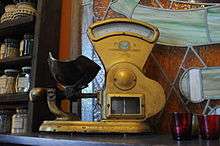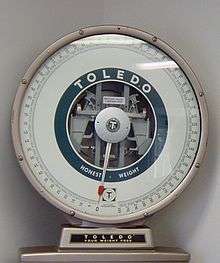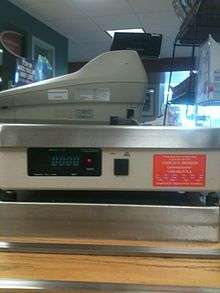Mettler Toledo
|
| |
| Public | |
| Traded as |
NYSE: MTD S&P 500 Component |
| Industry | Scientific instruments |
| Predecessor |
|
| Founded | 1989 |
| Headquarters | Greifensee, Switzerland |
Area served | Worldwide |
Key people | |
| Revenue |
|
|
| |
| Profit |
|
Number of employees | 13,100 (2014)[1] |
| Divisions |
|
| Website |
www |
Mettler-Toledo (NYSE: MTD) is a multinational manufacturer of scales and analytical instruments. It is the largest provider of weighing instruments for use in laboratory, industrial, and food retailing applications. The company also provides various analytical instruments, process analytics instruments, and end-of-line inspection systems. The company operates worldwide, with 35% of net sales derived from both Europe and the Americas, and 30% from Asia and other countries.[1]
Formation and history
Toledo Scale Company



Allen DeVilbiss, Jr. (1873-1911) was an inventor who lived in Toledo, Ohio, USA. He became interested in the concept of weighing machines and conceived the idea of an automatic computing pendulum scale. He was able to prove his concept with a local butcher, who realized that customers appreciated the automatic computation which eliminated the risk of overcharging. While his invention gained in popularity, DeVilbiss was not interested in making it a viable business.[2]
In 1900, Henry Theobald (1868-1924) was fired from his job at the National Cash Register Company. He decided to start his own business, and was convinced that selling the automatic computing scales could be a good business. He solicited additional financial investors and purchased the company from DeVilbiss. On July 10, 1901, the Toledo Computing Scale and Cash Register Company was incorporated.[2]
By May 1902, Theobald's company was selling more than 100 cash registers with scales per month. By that time, John H. Patterson, Theobald's boss from NCR, threatened to sue the new company for patent infringements. As an alternative, Patterson offered to purchase all cash register patents and property, along with the stipulation that Theobald would no longer engage in the cash register business. The investors, who worried about the costs of patent infringement litigation, agreed to the sale in June 1902. Since cash registers were no longer part of Theobald's business, he changed the name to Toledo Computing Scale Company. Theobald later coined the phrase "No Springs, Honest Weight" as a slogan for the new company.[2][2]
In the years that followed, Theobald realized that the weighing scale was the most important part of the retail transaction between the merchant and the customer. He felt that many of his competitors who used spring scale technology, especially Dayton Scale Company, were allowing merchants to cheat their customers by incorrectly calculating the total price of a measured good. He campaigned for more government regulation of weights and measures to eliminate dishonest weighing systems. On October 1, 1907, Massachusetts adopted the first weights and measures laws in the United States.[3]
In 1912, the company name changed once again, to Toledo Scale Company.[4] Additionally, a new scale line featuring a double pedulum mechanism and a dial face was introduced and was most suited for industrial applications.[5]
Mettler Instruments AG
In 1945, Dr. Erhard Mettler, a Swiss engineer, started a precision mechanics company in Küsnacht, Switzerland. He invented the substitution principle with a single-pan balance, capable of being produced in series. Analytical balances with a single weighing pan gradually replaced conventional two-pan balances in the laboratory.
Mettler diversified its product line in 1970 with the introduction of its automated titration systems, and the acquisition of balance manufacturer Microwa AG. Mettler acquired its 500-employee competitor August Sauter KG, of Albstadt-Ebingen, Germany, in 1971, for its specialized industrial and retail scales.[6]
In 1980, Dr. Mettler sold his business to Ciba-Geigy AG. A third pillar - after laboratory and industrial - was created: the retail business. Technological progress had made it possible to advance retail scales to instruments for the management of perishable goods.
Mettler Toledo
In 1989, Reliance Electric sold the Toledo Scale division to Ciba-Geigy AG. The division was then merged with Mettler Instruments. The merger vastly increased the global scope of the company, which, as a result, operated in 18 countries. Mettler acquired another competitor, Ohaus Corp., in 1990.[6] In 1992, the company was incorporated as Mettler Toledo, Inc.[5]
In 1996/97, Mettler Toledo, Inc. was sold by Ciba-Geigy AG to the New York-based AEA Investors Inc., in preparation for a subsequent initial public offering. The initial public offering was completed and began trading on the New York Stock Exchange, under the ticker symbol NYSE: MTD.
The resultant company is currently headquartered in Greifensee, Switzerland, with offices for its many brands based around the world.
Operational Structure
Mettler-Toledo is a global manufacturer and marketer of precision instruments for use in laboratory, industrial and food retailing applications. They are geographically diversified with sales in 2012 derived 34% from Europe, 34% from the Americas, and 32% from Asia and other countries. The Company has an extensive global sales and service organization with approximately 6,000, or approximately one-half, of the employees providing sales and service in 36 countries. The Company has a manufacturing presence in Europe, the United States and China.[1]
Laboratory Instruments
1952, the measurement of up to one ten-millionth of a gram became possible with the laboratory balance products. "The Mettler Balance" proved to be a catchphrase in the laboratory. Consequently, with the advancement of microprocessor technology over the years, a wide range of products for the laboratory were invented, like automated titrators and thermal analyzers. Mettler-Toledo laboratory products and technology were able to improve processes in research and development, drug discovery and quality control. Application-specific software for balances provides data analysis opportunities to enhance accuracy, productivity and compliance.
RAININ Instrument
In 2001, Mettler-Toledo purchased Rainin Instrument, LLC, which is now a wholly owned subsidiary of Mettler-Toledo.[7] Rainin supplies precision instruments and services worldwide. Rainin pipettes provides automated chemistry systems used in drug and chemical compound discovery and development. The company also manufacturers and markets metal detection and other end-of-line inspection systems used in production and packaging.
THORNTON
Thornton, Inc. Process Analytics Division [8] founded in 1964 develops, manufactures, markets, and supplies instrumentation and sensors used for liquid process measurement and control applications.The instrumentation provides pure water treatment measurement & control for the pharmaceutical industry; and parameters of conductivity/resistivity, TOC, pH, DO, dissolved ozone and flow for the semiconductor and power industries.
INGOLD
Founded in 1948,[9] INGOLD specializes in solutions for pH, DO, conductivity, turbidity and CO2 for process analytics applications in chemical, pharmaceutical and food & beverage industries.
Industrial Instruments
The Company manufactures numerous industrial weighing instruments and related terminals and offer software for the pharmaceutical, chemical, food and other industries. In addition, it manufactures metal detection and other end-of-line product inspection systems used in production and packaging. The Company supplies automatic identification and data capture solutions, which integrate in-motion weighing, dimensioning and identification technologies for transport, shipping and logistics customers. The Company also offers heavy industrial scales and related software.
Cargoscan
Mettler-Toledo Cargoscan Dimensioning solutions are used by international transport companies, small carriers, warehouses and distribution centres around the world. Systems are all approved according to international weights and measures standards, ensuring high instrument performance. It has been shown that laser range finder technology provides high accuracy in the industry making an impact on a production's revenue.
Hi-Speed
Hi-Speed division joined Mettler-Toledo in 1981 to provide weighing solutions for laboratory, industrial, and food retailing applications. The Product Inspection Team provides the checkweighers, metal detection devices, and other end-of-line inspection systems for local and multinational companies worldwide
Safeline
Safeline was developed in 1989 at METTLER TOLEDO. The Safeline product was an advanced metal detector the used digital technology for increased sensitivity and accuracy.
To expand the detection solutions, METTLER TOLEDO acquired AVS Raytech and AVS Metrology in 2000. AVS Raytech manufactured x-ray inspection equipment. The x-ray inspection equipment combined with the detection products allowed companies to identify multiple contaminants as well as verifying product integrity and portion control.
CI-VISION
Mettler-Toledo CI-Vision is a wholly owned subsidiary of Mettler-Toledo Inc. The Mettler-Toledo Product Inspection Group, consisting of CI-Vision, Hi-Speed and Safeline, is a superior supplier of in-line checkweighers, metal detectors, machine vision systems and x-ray inspection systems.
Charitable Contributions
Mettler-Toledo actively participates in the United Way organization.The company offers employees opportunities to contribute financially or by supporting volunteer activity during paid company hours.
References
- 1 2 3 4 5 6 "Mettler Toledo 2014 Annual Report". Retrieved 9 August 2015.
- 1 2 3 4 Terry, Robert. Honest Weight. Xlibris Corporation. ISBN 0-7388-1330-3.
- ↑ "1907 Chap. 0535. An Act To Provide For The Testing And Sealing Of Weights, Measures And Balances Having A Device For Indicating The Price As Well As The Weight Of Commodities Offered For Sale." (PDF). State Library of Massachusetts. Retrieved 9 August 2015.
- ↑ "A Century of Toledo Scale". Toledo's Attic. Retrieved 9 August 2015.
- 1 2 "The Toledo Scale Collection, 1900-1980". Retrieved 31 October 2014.
- 1 2 "History of Mettler-Toledo International Inc.," International Directory of Company Histories, Vol. 30, St. James Press, 2000.
- ↑ http://www.sec.gov/Archives/edgar/data/1037646/000103764601500013/tpexhibit.txt
- ↑ http://investing.businessweek.com/research/stocks/private/snapshot.asp?privcapId=1050223
- ↑ "New Portable Dissolved Oxygen Measurement System From Mettler-Toledo Ingold". Bloomberg.
External links
-
- Business data for Mettler Toledo: Google Finance
- Yahoo! Finance
- Reuters
- SEC filings